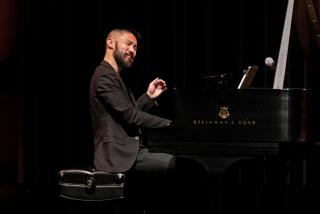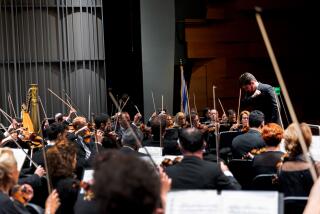Janacek: The Jagged Edge
The oft-quoted business about composer Leos Janacek deriving his musical language from Czech speech patterns may be meaningful to his compatriots, but most of us are forced to take such an observation on trust. And ignoring it altogether hardly suggests a lack of responsiveness to his music.
Western audiences and performers are taking with increasing fervor to a composer whose highly original creations were known only to the happy few a quarter of a century ago.
Janacek’s most familiar orchestral work is the delectably raucous “Sinfonietta,” a product of his richly productive final years, the 1920s, when he was in his 70s.
While there is no shortage of recordings of the “Sinfonietta,” none quite matches the fierce, rawboned exuberance of one made in 1960 by conductor Charles Mackerras with a pickup band of London players calling itself the Pro Arte Orchestra.
Long unavailable, it returns now on CD, more impressive than ever, with digital remastering (EMI/ Angel 63779, mid-price) and in the company of preludes to four Janacek operas and familiar charmers by Weinberger and Smetana. Not to be missed.
The splendor of the 1926 “Glagolitic” Mass--Glagolitic being a language derived from the Byzantine church, which preceded the use of Latin in Czech worship--its jagged phrases and thrillingly high-lying vocal lines are blunted in a proficient but too-well-behaved interpretation by soloists and the Atlanta Symphony and Chorus under Robert Shaw (Telarc 80287).
Two currently available versions of the Mass, both on the Supraphon label, with Czech forces led by Mackerras and Karel Ancerl, represent the music more accurately.
Shaw and company are, however, on the mark in the coupling, the lusty Te Deum that Dvorak wrote for his American conducting debut, at Carnegie Hall in 1892.
The Te Deum is as extroverted as any of the composer’s “Slavonic Dances,” with an extra dollop of brassy, percussive, Eastern splendor--a foretaste of Janacek’s Mass.
The chamber Janacek is very much the same man as the orchestral and vocal composer. Here too he is unconcerned with his executants’ capabilities. The music is all, resulting in some extraordinary tests of physical endurance.
Still, the septuagenarian’s two string quartets--notably the second, subtitled “Intimate Letters”--are approaching 20th-Century repertory status, challenging Bartok’s Second and Fourth Quartets in frequency of performance.
Here, the Janacek hallmarks--terse, saw-tooth phrases, edgy syncopation, vast leaps, unsettling tremolos and pregnant pauses--are refined to a burning, invigorating essence.
Every important Czech ensemble, and there are perhaps more world-class string quartets per capita in that country than in any other, has recorded this music. But there is a special kick to the 22-year-old efforts of the Vlach Quartet of Prague, reissued in splendid sound on a curiously monikered Czech label, Panton/The Very Famous (1203), which offers its wares on full-length CDs retailing at all of $5 each.
The Vlach projects in its lush-toned playing the composer’s 20th-Century musical character without ignoring his Romantic roots. The interpretation is marked by vivacious rhythmicality while reveling in old-fashioned, fearless portamento and wide, matched ensemble vibrato.
And that’s not all you get for your fiver: Panton/TVF throws in another of the aged composer’s marvels, “Youth,” his recollections of a Moravian boyhood, delivered with irresistible panache and idiomatic aplomb by the Foerster Wind Quintet.
Soviet-born pianist Mikhail Rudy, now residing in France, challenges the classic Rudolf Firkusny interpretations of Janacek’s music for solo piano in an attractive program that includes the brooding Sonata and the impressionistic “In the Mist” and “On an Overgrown Path” (EMI/Angel 54094).
In contrast to Firkusny’s bracingly sharp-edged readings (on both the DG and RCA labels), in which color and sentiment are secondary considerations, Rudy conveys a feeling of lyric, improvisatory grace within a broad coloristic range.
Janacek’s two major (again, latter-years) compositions for piano and chamber ensemble, the Capriccio for piano left-hand, winds and brass and the Concertino with winds and strings, are in the powerful hands of Viktoria Postnikova. The effect of both is, however, mitigated by the presence of her conductor-husband, Gennady Rozhdestvensky, who leads members of L’Orchestre de Paris.
Rozhdestvensky, usually a most welcome presence, may on this occasion guide the ensemble through the scores’ harrowing rhythmic complexities, but his tempos can be numbingly slow, as in the third-movement mock waltz of the Capriccio.
On her own, the pianist brings digital strength, depth of tone and well-gauged tempos to “In the Mist,” “Overgrown Path” and the Sonata. But the bases have already been covered by Firkusny and Rudy.
More to Read
The biggest entertainment stories
Get our big stories about Hollywood, film, television, music, arts, culture and more right in your inbox as soon as they publish.
You may occasionally receive promotional content from the Los Angeles Times.










